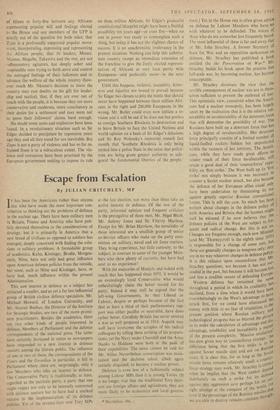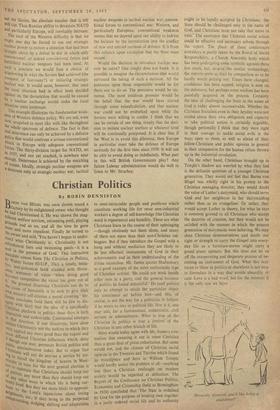Escape from Escalation
By JULIAN CRITCHLEY, MP
IT has been the Americans rather than anyone else who have made the most important con- tribution to thinking out the problems of defence in the nuclear age. There have been military men in Britain, France and America who have pub- licly devoted themselves to the considerations of strategy, but it is primarily in America that a new breed of civilians as opposed to soldiers has emerged, deeply concerned with finding the solu- tions to military problems. A formidable group of academics, Kahn, Kissinger, Brodie, Morgen- stern, Nitse, have not only had great influence upon American defence policies from the outside, but some, such as Nitse and Kissinger, have, or have had, much influence within the present Administration.
This new interest in defence as a subject has attracted a smaller, and as yet a far less influential group of British civilian defence specialists. Mr. Michael Howard, of London University, and Mr. Alastair Buchan, the Director of the Institute for Strategic Studies, are two of the more promi- nent practitioners. Besides the academics, there are two other kinds of people interested in defence, Members of Parliament and the defence correspondents of the national press. The latter have certainly increased in status as newspapers have responded to a new interest in defence matters among the literate public. The influence of one or two of them, the correspondents of the Times and the Guardian in particular, is felt in Parliament where there are, surprisingly, only a few Members who take an interest in defence. The Conservative Party is traditionally, at least, regarded as the patriotic party, a party that one might expect not only to be intensely concerned with defence matters but to have had a marked success in the implementation of its defence policies. Yet of the seventy-four new Tory MPs
at the last election, not more than three take an active interest in defence. Of the rest of the party, informed opinion and frequent criticism is the prerogative of three men, Mr. Nigel Birch, Mr. Aubrey Jones and Sir Fitzroy Maclean. Except for Mr. Brian Harrison, the remainder of those interested are a smallish group of senior ex-Service officers who make up the party com- mittees on military, naval and air force matters. They bring experience, but little curiosity, to the subject, in contrast to some of the younger Mem- bers who show plenty of curiosity, but have had next to no experience! With the memories of Munich. and indeed with much that has happened since 1951, it would be
an exceedingly loyal Conservative who would
unhesitatingly claim the better record for his party. Indeed it may well be argued that the
left-wing Governments, be they Liberal or
Labour, despite or perhaps because of the fact that at least a third of their parliamentary sup- port was either pacifist or neutralist, have done. rather better. Certiinly Britain has never entered a war as well prepared as in 1914. Asquith may well have overcome the scruples of his radical
colleagues by telling them nothing of his prepara- tions, yet the Navy under Churchill and the Army
thanks to Haldane were both at the peak of their capabilities. The same cannot be said for Mr. Attlee. Nevertheless, conscription was main- tained and the decision taken, albeit again initially disguised, to become a nuclear power.
Defence is even less of a fashionable subject among Labour MPs than it is among Tories. (It is no longer true that the traditional Tory inter- ests are foreign affairs and agriculture, they are more likely to be economics and local govern-
* Macmillan, 40s. ment.) Yet in the House one is often given advice on defence by Labour Members who have no wish whatever to be defended. The voices of
those who do are somewhat less frequently heard. 1-he most influential of these is far and away that
of Mr. John Strachey. A former Secretary of State for War and an opposition spokesman on defence, Mr. Strachey has published a book
entitled On the Preservation of War.* Mr. Strachey builds his book upon the premise that full-scale war, by becoming nuclear, has become unacceptable. Mr. Strachey dismisses the view that the terrible consequences of nuclear war are in them- selves sufficient to prevent the outbreak of war. This optimistic view, conceived when the Ameri-
cans had a nuclear monopoly, has been largely upset by the realisation that it is the relative vul-
nerability or invulnerability of the deterrent force that will determine the possibility of war. The Russians have built up a deterrent force that has a high degree of invulnerability. Her deterrent force principally consists of a limited number of liquid-fuelled rockets hidden but unprotected within the vastness of her territory. The Ameri- cans, while they have made great efforts to render much of their force invulnerable, still retain a good deal of their `counterforce' capa- bility on 'first strike.' The West built up its 'first strike' not simply because it was necessary to counter a Soviet nuclear attack, but also because the defence of her European allies could only have been undertaken by threatening its use against greatly superior Russian conventional forces. This is still the case. So much has been written about changes in the defence policy of both America and Britain that the layman might well be excused if he now believes that the defence policies of the West arc subject to fre- quent and radical change. But this is not so. Changes are frequent enough, each new Minister (and Mr. Thorneycroft is the eighth since 1951) is responsible for a change of some sort, but these are generally changes in weapons only; they are in no way whatever changes in defence Policy' It is this reliance upon counterforce that 1‘41% Strachey questions; not because it has not sue" ceeded in the past, but because it will become less and less a credible means of defending Europe. Western defence has remained the same throughout a period in which its credibility has declined, from a time when it would have heel overwhelmingly to the West's advantage to have enemy with little or no fear of retaliation, to the present position where Russian militarY and technological progress has so blurred the as to make the calculation of advantage and dis- advantage, advantage, credibility and incredibility a lettr of the greatest complexity. 'Massive retaliat,wthie has now given way to `counterforce strategy'he difference being that the first strike is to,an against Soviet missile sites and not on Ross:iiet cities. It is clear that, for as long as the Se —reef- missile force remains relatively small, a coon ect force strategy may work. Mr. Strachey is cord when he implies that the West cannot dePce indefinitely on such a strike for its defence n our against any aggression save perhaps for a- r
o
right attempt at the conquest of the w° .rid, f ,at even if the percentage of the Russian missiles oi we are able to destroy remains constant through
struck first, 'for we could have eliminated the
out the Sixties, the absolute number that is left will rise. Thus Russian ability to devastate NATO and Particularly Europe, will inevitably increase. The root of the Western difficulty is that we might one day be forced to use our strategic nuclear power to restore a situation that had been brought about by a defeat in war in which only conventional, or indeed conventional forces and battlefield nuclear weapons had been used. At such a juncture we would face a choice of acquiescing in what the Soviets had achieved (the conquest of Germany?) or initiating strategic nuclear war. It would seem, however, that once the local situation had in effect been decided against us, the devastation that would be caused by a nuclear exchange would make the local situation seem irrelevant. 1 his example illustrates the fundamental weak- ness of Western defence policy. We are not, even now prepared to meet like with like throughout the whole spectrum of defence. The fact is that real deterrence can only be achieved by a defence 13°1JcY that would confront a serious conventional attack in Europe with adequate conventional Tutees. The thirty-division target for NATO, set r.ln 1957, and not yet reached, is nowhere near :311,°°gh. Deterrence is achieved by the matching means. Ideally, strategic nuclear weapons are a deterrent only to strategic nuclear war, tactical
nuclear weapons to tactical nuclear war, conven- tional forces to conventional war. Western, and particularly European, conventional weakness means that we depend upon our ability to redress the balance by the introduction into the conflict of new and untried methods of defence. It is from this reliance upon escalation that the West must escape.
Would the decision to introduce nuclear war ever be taken? One simply does not know. It is possible to imagine the circumstances 4hat would surround the taking of such a decision. All the pressures upon those responsible would be for them not to do so. The pressures would be im- mense. The most insidious pressure would be the belief that the war would have started through some miscalculation, and that nuclear war could not be embarked upon while the Soviets were willing to confer. I think that we can be certain of one thing, simply that the deci- sion to initiate nuclear warfare at whatever level will be continually postponed. It is clear that if the West is to avoid this dilemma, then Europe in particular must take the defence of Europe seriously for the first time since 1939. It will not be able to avoid doing so indefinitely. What part in this will British Governments play? Any future Labour administration would do well to listen to Mr. Strachey.



































 Previous page
Previous page